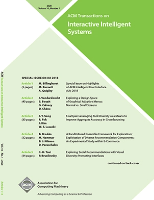
ACM Transactions on Interactive Intelligent Systems
Scope & Guideline
Pioneering Research in AI and User-Centric Design.
Introduction
Aims and Scopes
- Human-AI Collaboration:
The journal explores how humans and AI can work together effectively, focusing on trust, transparency, and the dynamics of human-AI teams. - Explainable AI (XAI):
A significant emphasis is placed on developing AI systems that can explain their reasoning and decisions to users, enhancing trust and usability. - Interactive Data Visualization:
Research in this area focuses on improving how users interact with complex data through visual means, including explorations into user-centered design and analytics. - User Experience and Interaction Design:
The journal covers methodologies for designing interfaces that enhance user experience, particularly in the context of intelligent systems. - Ethics and Bias in AI:
TiiS addresses the ethical implications of AI technologies, including fairness, bias mitigation, and responsible AI use. - Adaptive and Personalized Systems:
Research often investigates how systems can adapt to individual user needs and preferences, improving the overall interaction experience. - Social and Emotional AI:
The journal explores the development of AI that can recognize and respond to human emotions and social cues, facilitating better interactions.
Trending and Emerging
- Trust and Transparency in AI Systems:
Recent publications emphasize understanding how users can trust AI systems, focusing on transparency and explainability as critical factors in user acceptance. - AI Ethics and Fairness:
There is a growing trend towards addressing ethical concerns related to AI, particularly focusing on bias mitigation and fairness in AI applications. - Natural Language Interfaces:
The popularity of natural language processing and conversational interfaces is increasing, with a focus on how they can facilitate better user interactions and data exploration. - Interactive Machine Learning:
Research on integrating user feedback into machine learning processes is trending, highlighting the importance of human input in refining AI models. - Visual Analytics and Data Interpretation:
Emerging themes include the development of tools and techniques for visualizing complex data, enhancing user understanding and decision-making through interactive analytics. - Personalization Techniques in Intelligent Systems:
An increased focus on adaptive systems that cater to individual user preferences and contexts is evident, reflecting the demand for more personalized interactions.
Declining or Waning
- Traditional User Interface Design:
As intelligent systems become more integrated into everyday applications, traditional user interface design approaches that do not incorporate AI or adaptive elements are becoming less prominent. - General AI Applications without Human-Centric Focus:
Papers discussing AI applications without emphasizing human interaction or user experience are appearing less frequently, suggesting a shift towards more user-centered AI research. - Basic Interaction Techniques:
Research focusing solely on basic interaction techniques without the incorporation of intelligent systems or data-driven insights is declining, as the field moves towards more complex and integrated solutions. - Non-interactive AI Systems:
There is a noticeable reduction in the exploration of AI systems that do not involve interactive components or user engagement, aligning with the journal’s current focus on interactivity.
Similar Journals
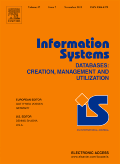
INFORMATION SYSTEMS
Advancing the frontiers of Information Systems research.INFORMATION SYSTEMS is a premier journal published by PERGAMON-ELSEVIER SCIENCE LTD, dedicated to advancing the fields of Information Systems, Hardware and Architecture, and Software. With its ISSN 0306-4379 and E-ISSN 1873-6076, this prestigious journal has established a significant presence in the academic community since its inception in 1975, paving the way for innovative research that continues through 2025. Ranked within the Q1 quartile across its core categories, INFORMATION SYSTEMS holds a notable position, with Scopus rankings including #28 in Computer Science - Hardware and Architecture and #64 in Software, both in the 84th percentile. Although it currently does not offer open access, the journal thrives as a vital resource for researchers, professionals, and students, fostering an environment where cutting-edge studies and industry applications converge. Housed in the United Kingdom, at The Boulevard, Langford Lane, Kidlington, Oxford OX5 1GB, England, this journal highlights its commitment to driving scholarly advancements and supporting the evolution of information technologies.

Cognitive Systems Research
Advancing the Frontiers of Cognitive UnderstandingCognitive Systems Research, published by ELSEVIER, is a prestigious journal dedicated to advancing the field of cognitive systems, a dynamic intersection of Artificial Intelligence, Cognitive Neuroscience, and Experimental Psychology. With an impressive impact factor and ranked in the Q2 category across multiple disciplines, this journal is recognized for its contribution to fundamental and applied research, making it an essential resource for researchers, professionals, and students alike. The journal's scope encompasses innovative studies that push the boundaries of how cognitive processes are understood and simulated within computational frameworks. With a commitment to fostering open science, articles are made readily accessible, promoting the rapid dissemination of knowledge. As the field evolves from 1999 to 2024, Cognitive Systems Research stands as a pivotal forum for the exploration and development of cognitive theories and systems, welcoming high-quality submissions that encourage interdisciplinary collaboration.
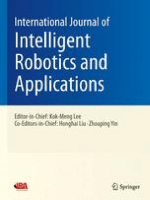
International Journal of Intelligent Robotics and Applications
Pioneering Research in Robotics and AI ApplicationsInternational Journal of Intelligent Robotics and Applications, published by SPRINGER SINGAPORE PTE LTD, is a pivotal platform dedicated to advancing the field of robotics and artificial intelligence. With an ISSN of 2366-5971 and an E-ISSN of 2366-598X, this journal has established its presence since its inception in 2017, showcasing innovative research and applications up until 2024. The journal aims to foster interdisciplinary collaboration by publishing high-quality articles that cover a broad range of topics from foundational AI concepts to cutting-edge robotics technologies. It holds respectable rankings, positioned in the Q3 category of Artificial Intelligence and Q2 category of Computer Science Applications in the 2023 metrics, and is indexed in Scopus with notable rankings in both computer science disciplines. Although it follows a subscription model, the journal remains committed to facilitating access to groundbreaking research for its audience of researchers, professionals, and students, contributing to the ever-evolving landscape of intelligent robotics.

Journal of Computer Languages
Catalyzing Discussions on Emerging TechnologiesJournal of Computer Languages, published by ELSEVIER SCI LTD in the United Kingdom, serves as a crucial platform for advancing research and discussion in the fields of computer networks, human-computer interaction, and software development. With an ISSN of 2590-1184 and E-ISSN 2665-9182, this journal has established itself as a prominent resource within its category, achieving Q3 rankings in 2023 across its respective domains. As part of Scopus' indexed journals, it stands at impressive ranks of #152/395 in Computer Networks and Communications, #172/407 in Software, and #76/145 in Human-Computer Interaction, reflecting its relevance and contribution to the scholarly community. Operating under an open access model, the journal emphasizes accessibility and collaboration among researchers, professionals, and students keen on exploring innovative applications and advancements in computer languages. With a publication span extending from 2019 to 2024, the year-to-year growth reinforces its commitment to impacting both academia and industry significantly. Engage with cutting-edge research and foster your understanding in computer languages through this essential publication.

Intelligent Decision Technologies-Netherlands
Driving Excellence in Intelligent Decision Technologies.Intelligent Decision Technologies-Netherlands, published by IOS PRESS, is an emerging journal dedicated to the dynamic fields of Artificial Intelligence, Computer Vision, and Human-Computer Interaction. Established in 2007 and continuing through 2024, this journal aims to foster interdisciplinary research and innovation by providing a platform for cutting-edge studies and applications of intelligent systems. While its current impact factor reflects a growing influence within the scientific community, with quartile rankings ranging from Q3 to Q4 in various pertinent disciplines, Intelligent Decision Technologies plays a pivotal role in shaping future research directions. Although the journal does not offer open access, it remains accessible across academic institutions, encouraging researchers, professionals, and students to contribute to and engage with the latest advancements in decision technologies. With a commitment to quality and relevance, this journal seeks to advance knowledge and enhance the understanding of intelligent systems in today's rapidly evolving technological landscape.

USER MODELING AND USER-ADAPTED INTERACTION
Bridging Technology and Education with Adaptive SolutionsUSER MODELING AND USER-ADAPTED INTERACTION, published by SPRINGER, stands as a pivotal journal within the realms of Computer Science Applications, Education, and Human-Computer Interaction. With an ISSN of 0924-1868 and an E-ISSN of 1573-1391, this journal has established a reputable presence since its inception in 1991, continuing to contribute to the scholarly discourse through 2024. With an impressive impact factor reflective of its high visibility, it is ranked in the top quartiles, notably Q1 in both Computer Science Applications and Education, and Q2 in Human-Computer Interaction as of 2023. This positions the journal within the 95th percentile in Social Sciences Education and the 81st percentile in Human-Computer Interaction. As it encompasses a broad scope that integrates user modeling techniques with adaptive interaction strategies, the journal caters to the needs of researchers, professionals, and students keen on advancing knowledge in adaptive technology, educational tools, and user-centric design. While not currently open access, it remains a valuable resource for anyone interested in the intersection of user experience and technological adaptation.
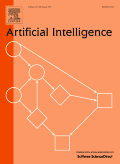
ARTIFICIAL INTELLIGENCE
Transforming Ideas into Breakthroughs in AI and LinguisticsArtificial Intelligence, published by Elsevier, is a premier scholarly journal that has been at the forefront of research in the fields of Artificial Intelligence, Linguistics, and Language Studies since its inception in 1970. With a prestigious ranking in the Q1 quartile for both its primary categories, the journal is recognized for its significant contributions to the understanding and advancement of AI technologies and their applications in natural language processing. It is highly regarded in academic circles, reflected in its exceptional Scopus Rankings—placing it in the 99th percentile in both Arts and Humanities, and Social Sciences, as well as a respectable 85th percentile in Computer Science, specifically within Artificial Intelligence. Although Open Access options are not currently available, the journal provides a vital platform for researchers, professionals, and students to disseminate groundbreaking ideas, fostering innovation and collaboration in this rapidly evolving field. The journal's comprehensive scope aims to bridge theoretical advancements with practical applications, making it an invaluable resource for those seeking to explore the intersection of technology and linguistics.
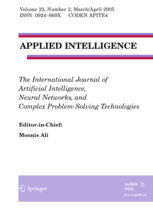
APPLIED INTELLIGENCE
Connecting research and practice in the world of AI.Applied Intelligence is a prominent peer-reviewed journal that has been instrumental in advancing the field of Artificial Intelligence since its inception in 1991. Published by Springer, a reputable name in academic publishing, the journal focuses on the innovative applications of intelligent systems, algorithms, and methodologies across various disciplines. With an impressive Q2 ranking in the Artificial Intelligence category for 2023, and a Scopus rank of #117 out of 350 in its field, Applied Intelligence is recognized for its significant contributions and rigorous standards. The journal is accessed primarily through subscription, ensuring that high-quality research reaches the academic community and industry professionals alike. Its commitment to disseminating cutting-edge research makes it an invaluable resource for researchers, practitioners, and students interested in the practical implications of AI advancements. Join a community dedicated to exploring the transformative power of artificial intelligence and stay ahead in this ever-evolving field!
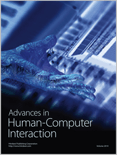
Advances in Human-Computer Interaction
Exploring the future of interaction.Advances in Human-Computer Interaction is a premier peer-reviewed journal published by HINDAWI LTD, dedicated to the exploration of cutting-edge research and innovation in the field of Human-Computer Interaction (HCI). With an ISSN of 1687-5893 and an E-ISSN of 1687-5907, this Open Access journal has been contributing to the scientific community since 2008, offering unrestricted access to critical findings and advancements. Based in Egypt with an address at ADAM HOUSE, 3RD FLR, 1 FITZROY SQ, LONDON W1T 5HF, ENGLAND, it occupies a notable position in the academic landscape, reflected in its 2023 Scopus ranking of Rank #57/145 and a 61st percentile in the Human-Computer Interaction category. As a Q3 journal, it plays a crucial role in disseminating research that bridges the gap between humans and technology, providing valuable insights for researchers, professionals, and students pursuing expertise in this dynamic field. The journal’s converged years from 2010 to 2024 signify its ongoing commitment to advancing knowledge and fostering collaboration among HCI experts worldwide.

International Journal of Interactive Multimedia and Artificial Intelligence
Pioneering Research at the Intersection of AI and MultimediaThe International Journal of Interactive Multimedia and Artificial Intelligence, published by UNIV INT RIOJA-UNIR in Spain, is a leading Open Access journal that has been fostering knowledge dissemination in the field since 2008. With an ISSN of 1989-1660 and an impressive impact characterized by its Q1 and Q2 rankings across major categories in Artificial Intelligence and Computer Science, the journal serves as a crucial platform for researchers and professionals eager to explore innovative applications and technological advancements. This journal is particularly distinguished by its commitment to high-quality peer-reviewed research, evident in its current Scopus rankings, which place it among the top percentile in various computer science domains, including Statistics, Signal Processing, and Computer Vision. The journal's scope encompasses a wide array of topics that intersect with multimedia and artificial intelligence, making it an invaluable resource for students and emerging scholars aiming to deepen their understanding and contribute to these vibrant fields. Through its Open Access model, it ensures that research is accessible to a global audience, thus enhancing the visibility and impact of the scientific discourse.